Did you know that the Tonga people of southern Zambia have implemented conservation practices that have preserved their local biophysical environment for centuries? These strategies, including selective harvesting, totemism and taboos, organic farming, and the sanctity of water sources, have resulted in the preservation of soil, water, animals, medicinal and fruit plants, and rangeland in the region. The Tonga’s commitment to nature conservation provides valuable insights and lessons for environmental sustainability.
Key Takeaways:
- The Tonga people have employed various strategies, such as selective harvesting and totemism, to sustain their local biophysical environment.
- Organic farming, crop rotation, and the sanctity of water sources contribute to the preservation of biodiversity and the overall health of the Tonga’s natural environment.
- The Tonga’s conservation practices offer valuable insights and lessons for governments, policymakers, and environmentalists in achieving environmental sustainability.
- Recognizing and prioritizing the conservation strategies employed by indigenous communities like the Tonga is crucial for the long-term preservation of biodiversity.
- Combining traditional knowledge with contemporary environmental policies can contribute to addressing the challenges of environmental degradation and promoting sustainability.
Tonga Traditional Knowledge and Conservation
The Tonga people possess a wealth of traditional knowledge that has been passed down through generations, allowing them to maintain a harmonious relationship with their environment for centuries. Their cultural practices, such as totemism, taboos, and a deep reverence for water sources and sacred areas, are integral to their conservation efforts. Through these practices, the Tonga demonstrate a profound understanding of the local ecosystem and employ sustainable techniques like organic farming, crop rotation, and selective harvesting to preserve biodiversity and promote the overall health of their natural environment.
By embracing their sacred ecology, the Tonga people ensure the interconnection between their cultural heritage and the conservation of biodiversity. The combination of traditional knowledge and sustainable practices exemplifies the importance of indigenous wisdom in protecting and preserving our natural world. Through their deep connection to the land and their traditional ecological practices, the Tonga demonstrate that human societies and nature can thrive in harmony.
“Our cultural practices, rooted in a deep understanding of our environment, guide us in nurturing and protecting the sacred ecology that sustains us. It is through our traditional knowledge that we find the balance between human needs and the conservation of our natural heritage.” – Tonga Elder
Living in Harmony with the Environment
The Tonga people’s traditional practices exemplify their commitment to living in harmony with nature. Their organic farming techniques minimize the use of synthetic pesticides and fertilizers, preserving the natural balance of the ecosystem. Crop rotation ensures the long-term fertility of the soil, while selective harvesting allows for sustainable resource extraction, ensuring the regeneration of plant and animal populations.
Moreover, the Tonga’s cultural beliefs and taboos contribute to biodiversity conservation. Totemism, which involves the identification with and protection of specific animal species, promotes the understanding that nature and humans are interconnected. By designating certain areas as sacred, the Tonga ensure the preservation of critical habitats and safeguard endangered species.
The Role of Tonga Traditional Knowledge in Biodiversity Conservation
It is essential to recognize the value of Tonga traditional knowledge in biodiversity conservation efforts. The Tonga’s deep understanding of their local environment, handed down through generations, provides valuable insights into ecological relationships and the intricate balance of ecosystems. This traditional knowledge can complement scientific expertise and enhance our understanding of sustainable practices.
Integrating Tonga traditional knowledge into environmental policies and conservation initiatives can empower indigenous communities like the Tonga, ensuring their active participation and ownership in sustainable development practices. By combining indigenous wisdom with modern approaches, we can achieve a more holistic and effective approach to biodiversity conservation that respects cultural heritage and fosters environmental sustainability.
African Indigenous Knowledge Systems and Environmental Conservation
Indigenous knowledge systems have played a crucial role in the successful conservation of the natural environment across various parts of Africa. These knowledge systems are developed by societies living closely with nature and encompass norms, a classification system for natural resources, empirical observations about the local environment, and self-management practices.
Traditional beliefs, cultural mores, and practices are integral to the conservation efforts associated with these knowledge systems. Among the Tonga people, for instance, traditional beliefs and cultural practices form a significant part of their environmental conservation practices. By recognizing and integrating indigenous knowledge systems into environmental policies and practices, sustainable development goals can be achieved, while also ensuring the conservation of biodiversity and the preservation of cultural heritage.
Incorporating Traditional Beliefs and Practices
Incorporating African indigenous knowledge systems into environmental governance requires the recognition and understanding of the cultural significance of these practices. By valuing traditional beliefs and practices, policymakers and institutions can bridge the gap between modern scientific approaches and traditional ecological knowledge.
“The combination of indigenous knowledge with contemporary scientific practices can provide holistic and context-specific solutions for environmental conservation.”
Traditional ecological knowledge encompasses a deep understanding of local ecosystems and includes practices such as totemism, taboos, and reverence for sacred areas and water sources. The Tonga people, through their traditional ecological knowledge, contribute to the preservation of biodiversity by implementing sustainable practices, such as organic farming and selective harvesting techniques.
Addressing Sustainability Challenges
While African indigenous knowledge systems offer valuable insights into environmental conservation, there are challenges to their integration and preservation. Limited documentation and dissemination of traditional ecological knowledge, inadequate recognition and support from policymakers and institutions, and the erosion of traditional knowledge due to modernization and globalization pose significant obstacles. To address these challenges, efforts must be made to document, preserve, and promote indigenous knowledge systems, fostering a deeper appreciation for the cultural heritage and sustainable development they encompass.
Examples of African Indigenous Knowledge Systems and Practices
| Indigenous Group |
Knowledge System |
Conservation Practices |
Impact on Biodiversity |
| Tonga |
Totemism and Taboos |
Organic farming, selective harvesting |
Preservation and sustainability of ecosystem |
| Maasai |
Oral Traditions |
Pastoralism, land management |
Protection of grazing lands, wildlife conservation |
| Bushmen |
San Bushman Knowledge system |
Tracking techniques, medicinal knowledge |
Efficient resource utilization, medicinal plant conservation |
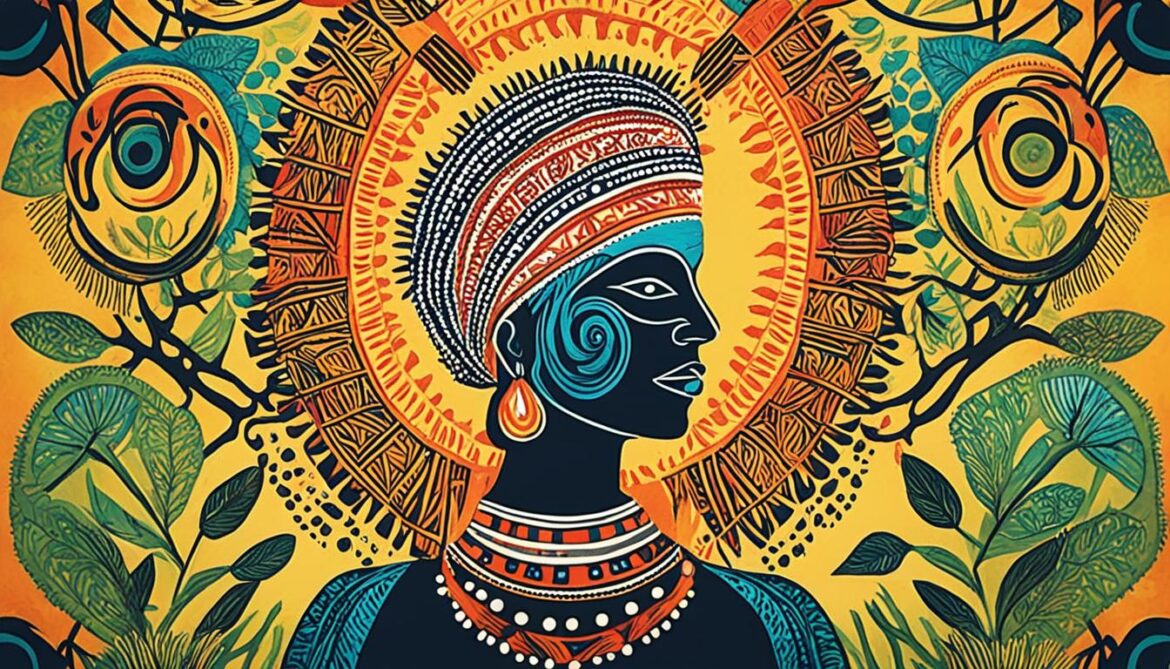
Tonga People’s Sustainable Practices
The Tonga people have sustainably lived within their biophysical environment for centuries. They practice shifting cultivation, mixed farming, and agroforestry, which are traditional modes of agriculture that promote long-term sustainability. These practices involve rotating crops, cultivating multiple plant species together, and incorporating trees into farming systems, providing ecological benefits such as soil fertility improvement and biodiversity conservation. By adopting these practices, the Tonga people ensure a balanced and resilient ecosystem, sustaining their livelihoods and maintaining a harmonious relationship with nature.
In addition to their sustainable agricultural practices, the Tonga people also have a strong cultural attachment to their environment. They possess a deep understanding of the land, plants, and animals around them, which is passed down through generations. This knowledge is invaluable in guiding their sustainable practices and preserving their cultural heritage. They believe in the power of herbal medicine derived from plants, using natural remedies to address health challenges. This practice not only reflects their respect for and reliance on nature but also contributes to the conservation of medicinal plant species.
“Going back to Eden” is a concept embraced by the Tonga people. It signifies their commitment to living in harmony with nature and preserving the environmental resources that sustain their community. This cultural perspective promotes the understanding that environmental sustainability is essential for the well-being of both humans and the natural world. The Tonga people’s reverence for their environment and their adherence to sustainable practices are key factors in ensuring the long-term environmental sustainability of their region.
Environmental Sustainability Through Cultural Heritage
The Tonga people’s sustainable practices are deeply rooted in their cultural heritage. Their traditional knowledge, conservation practices, and sustainable agriculture methods have been developed and refined over centuries, demonstrating the wisdom and resilience of indigenous communities. The Tonga people exemplify how cultural heritage can serve as a driving force for environmental sustainability.
The integration of traditional knowledge and cultural practices into contemporary environmental policies and practices is crucial for achieving sustainable development goals. Governments, policymakers, and environmental organizations are increasingly recognizing the value of indigenous wisdom and incorporating it into conservation strategies. By working in partnership with indigenous communities, such as the Tonga, we can learn from their sustainable practices, honor their cultural heritage, and forge a path towards a more environmentally sustainable future.
Achieving a Sustainable Future Together
As we strive to address the global challenges of environmental degradation and biodiversity loss, it is essential to recognize and learn from the sustainable practices of indigenous communities like the Tonga. Their knowledge, experiences, and cultural perspectives offer valuable insights into achieving environmental sustainability.
By combining their traditional ecological knowledge, sustainable agriculture practices, and cultural heritage with contemporary scientific research and environmental policies, we can create a comprehensive and holistic approach to environmental conservation. This collaboration between indigenous communities, governments, and conservation organizations will foster a sustainable future that respects cultural diversity, conserves biodiversity, and preserves the delicate balance between humans and nature.
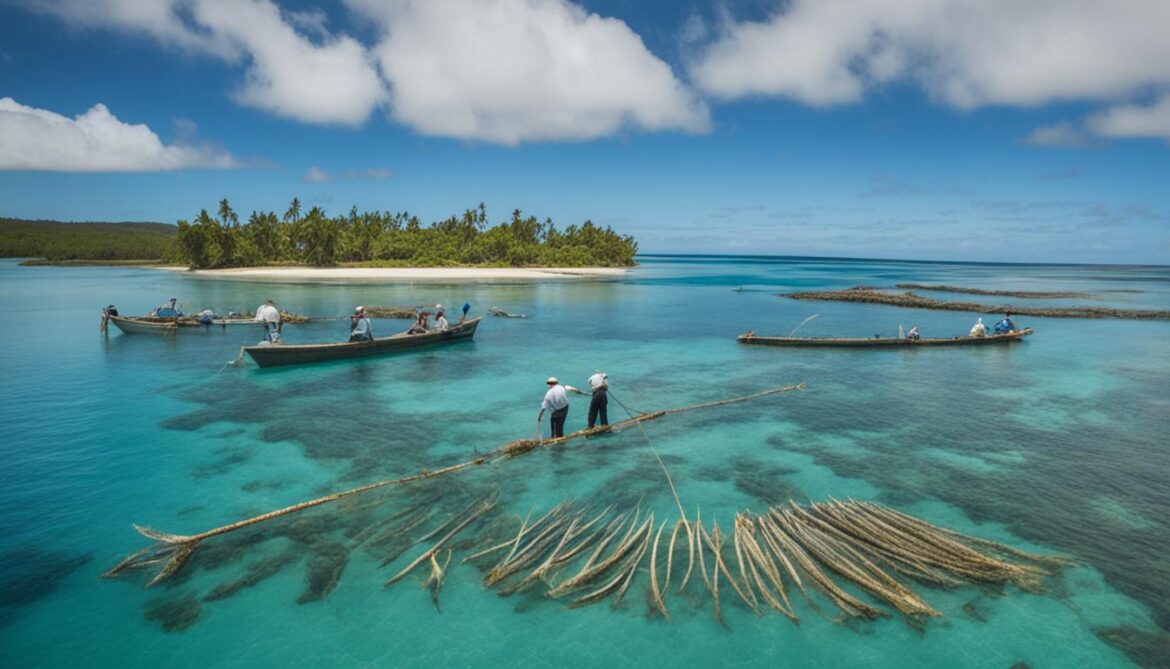
| Traditional Practices |
Sustainable Benefits |
| Shifting cultivation |
Promotes soil fertility and natural regeneration of forests |
| Mixed farming |
Diversifies agricultural output and minimizes pest and disease risks |
| Agroforestry |
Enhances soil structure, carbon sequestration, and biodiversity conservation |
| Herbal medicine |
Preserves traditional knowledge, promotes conservation of medicinal plant species |
Tonga Conservation Strategies in Context
The conservation strategies employed by the Tonga people of southern Zambia should be considered in the context of global environmental concerns. In today’s world, the degradation of the environment has become a critical issue, primarily due to the escalating exploitation of natural resources. To combat this environmental degradation and promote sustainability, a multi-faceted and interdisciplinary approach is necessary.
Indigenous knowledge, such as that practiced by the Tonga, offers valuable insights and strategies for environmental conservation. The Tonga have long utilized traditional conservation methods that have proven effective in preserving their rich biodiversity. By combining these traditional practices with contemporary environmental policies, we can address the challenges of biodiversity conservation and mitigate the impacts of environmental degradation.
“The environment is not ours; we are borrowing it from our children.” – Tonga saying
The Tonga’s conservation strategies encompass a range of practices, including selective harvesting, organic farming, and the preservation of sacred natural sites. These strategies are deeply rooted in the Tonga’s cultural heritage and their profound respect for the natural world. The ever-increasing importance of these strategies extends beyond local conservation efforts and has implications for addressing broader environmental challenges globally.
Proactively integrating the Tonga’s conservation strategies into environmental policies and practices can significantly contribute to the preservation of biodiversity and the overall health of our planet. By drawing from the wisdom of indigenous communities, like the Tonga, we can foster a more sustainable and harmonious relationship with the environment.
Benefits of Tonga Conservation Strategies
The Tonga’s conservation strategies offer several key benefits:
- Preserving biodiversity: The Tonga’s practices have been successful in maintaining a diverse range of plant and animal species, safeguarding the delicate balance of the ecosystem.
- Environmental resilience: Tonga conservation strategies help build the resilience of the environment, enabling it to withstand climate change and other disturbances.
- Sustainable resource management: The Tonga’s selective harvesting techniques ensure the sustainable use of natural resources, preventing overexploitation and promoting long-term resource availability.
- Cultural preservation: By incorporating the Tonga’s traditional knowledge into environmental conservation, we can safeguard their cultural heritage and promote cultural diversity.
Tonga Conservation Strategies in Action
One example of the Tonga’s conservation strategies in action is their practice of establishing sacred natural sites. These sites are considered spiritually and ecologically significant, serving as sanctuaries for biodiversity. The Tonga believe that by protecting these sacred sites, they are safeguarding the health and balance of the entire ecosystem.
Another notable practice is the Tonga’s emphasis on organic farming and sustainable agricultural techniques. They prioritize crop rotation, intercropping, and other methods that minimize soil degradation and maximize crop yields. By avoiding the use of synthetic pesticides and fertilizers, they maintain soil fertility and minimize the impact on surrounding ecosystems.
| Tonga Conservation Strategies |
Key Example |
| Sacred Natural Sites |
Preservation of spiritually and ecologically significant areas |
| Organic Farming |
Practices such as crop rotation and intercropping |
| Selective Harvesting |
Conservation of natural resources through careful and sustainable harvesting practices |
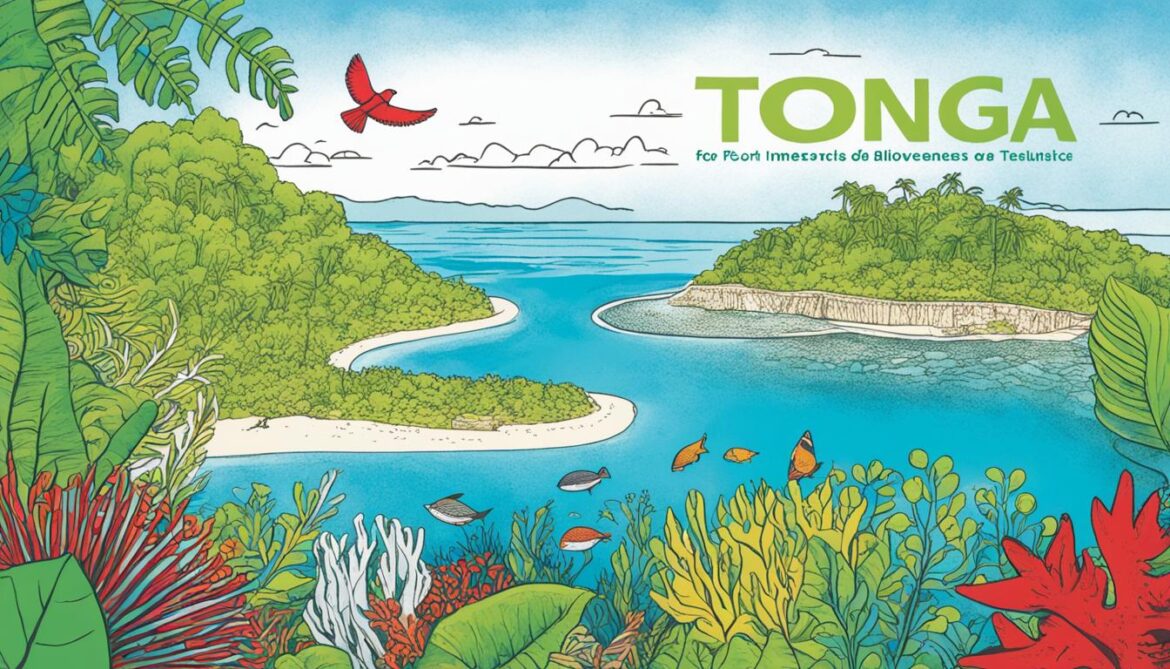
By recognizing and embracing the Tonga’s conservation strategies, we can not only protect their valuable heritage but also contribute to our collective efforts in addressing the pressing challenges of environmental degradation and biodiversity loss. It is imperative that we learn from indigenous communities like the Tonga and integrate their knowledge and practices into our environmental conservation efforts.
Recognition of Indigenous Knowledge in Biodiversity Conservation
The recognition and promotion of indigenous knowledge in biodiversity conservation are critical for achieving sustainable development goals. International organizations, such as the United Nations, have emphasized the importance of respecting, preserving, and maintaining the innovation and practices of indigenous and local communities related to the sustainable use of biological diversity.
Indigenous knowledge systems offer valuable insights into resource management, ecological wisdom, and cultural values that can contribute to effective biodiversity conservation efforts. The Tonga people’s traditional practices, rooted in their indigenous knowledge, represent a holistic approach to conservation that considers the interconnectedness of ecosystems and the sustainable use of natural resources.
“Indigenous knowledge is a unique form of knowledge, shaped by centuries of interaction between communities and their environment. It encompasses a deep understanding of the local ecosystem, including plant and animal behavior, seasonal patterns, and ecological processes,” said Dr. Jane Evans, a leading scientist in biodiversity conservation.
By recognizing and integrating indigenous knowledge into environmental policies and practices, we can tap into centuries of wisdom and adaptability that have sustained diverse ecosystems around the world. Incorporating such knowledge can help address the challenges of biodiversity loss, habitat degradation, and the impacts of climate change on natural resources.
United Nations Convention on Biological Diversity
The United Nations Convention on Biological Diversity (CBD) is an international agreement that recognizes the importance of conserving biodiversity and sustainable development. The CBD emphasizes the need to involve indigenous and local communities in biodiversity conservation efforts, acknowledging the critical role of their traditional knowledge and practices.
The CBD promotes the equitable sharing of benefits derived from the use of genetic resources and supports conservation strategies that are respectful of traditional knowledge systems. By empowering indigenous communities and acknowledging their rights, the CBD aims to foster collaborative partnerships that integrate indigenous knowledge into the broader framework of biodiversity conservation.
Indigenous knowledge, including the practices of the Tonga people, holds immense value for the future of biodiversity conservation. It offers unique insights into sustainable resource management, ecosystem preservation, and the interdependence between humans and the natural world. By embracing and incorporating indigenous knowledge, we can forge a path towards a more inclusive and effective approach to biodiversity conservation.
The Role of Indigenous Knowledge in Biodiversity Conservation
Indigenous knowledge systems provide a comprehensive understanding of the complex dynamics within ecosystems and the interconnections between cultural practices, environmental stewardship, and biodiversity conservation. The knowledge embedded in indigenous traditions, rituals, and oral histories holds valuable insights into the sustainable use of natural resources and the maintenance of ecological balance.
As Dr. Evans states, “Indigenous knowledge enhances our understanding of ecological processes and offers innovative solutions to pressing environmental challenges. It can inform land-use planning, habitat restoration, and the development of sustainable practices that benefit both human communities and the natural world.”
Through knowledge exchange and collaboration, indigenous communities and conservation practitioners can co-create effective strategies that safeguard biodiversity, while respecting cultural heritage and promoting sustainable development. By recognizing and valuing indigenous knowledge, we embrace a more holistic and inclusive approach to biodiversity conservation that has the potential for long-lasting positive impacts.
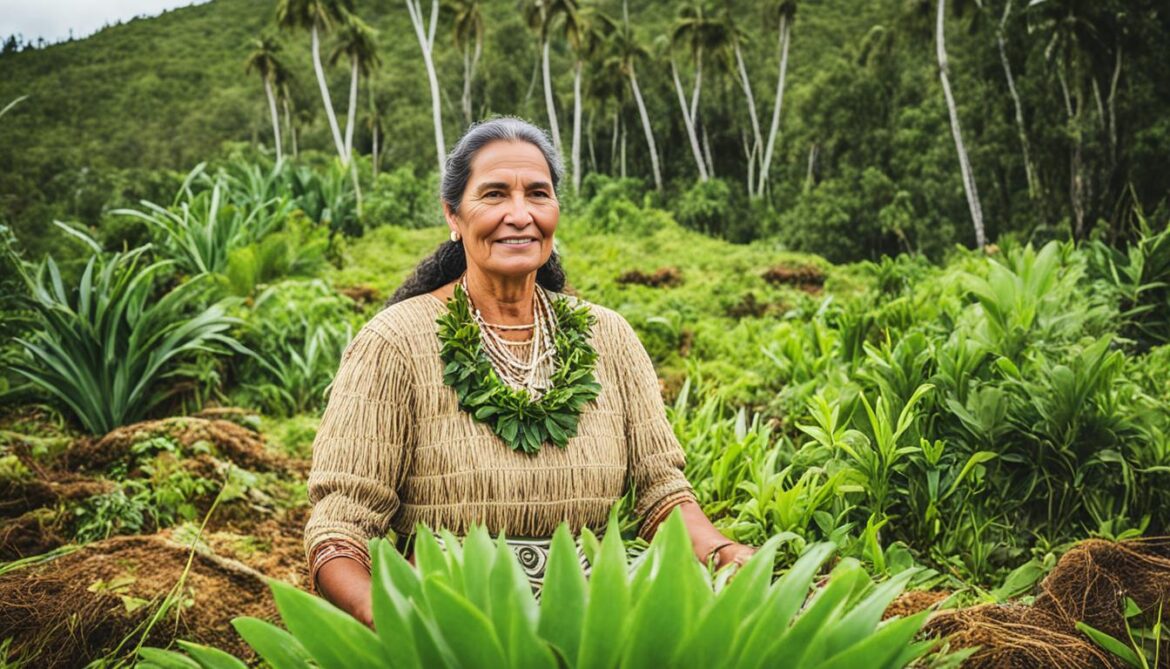
Role of Traditional Ecological Knowledge in Biodiversity Conservation
Traditional ecological knowledge (TEK) is a valuable source of ecological information that has been recognized by the Western scientific community. TEK refers to the cumulative knowledge and beliefs passed down through generations about the relationship between living beings and their environment. It is a form of local knowledge that is dynamic, cumulative, evolving, and place-based.
TEK encompasses social institutions, worldviews, and resource management systems that shape environmental perceptions and conservation practices. Indigenous communities, such as the Tonga, have rich traditional knowledge that contributes to biodiversity conservation efforts. By integrating TEK into conservation initiatives, the ecological sensitivity and effectiveness of these efforts can be enhanced.
TEK offers unique insights into sustainable resource management, ecological relationships, and cultural values. The Tonga’s traditional knowledge, for example, can guide conservation practices in their local environment, promoting the preservation of species and habitats. By valuing and incorporating TEK, we can learn from the wisdom of indigenous communities and work towards a more sustainable and harmonious relationship with nature.
“Integrating traditional ecological knowledge into conservation initiatives enhances ecological sensitivity and effectiveness.”
The Importance of Indigenous Technical Knowledge
Indigenous technical knowledge (ITK), a component of TEK, holds valuable insights into the practical aspects of resource management. It includes traditional practices, skills, and techniques developed by indigenous communities over generations. This knowledge is grounded in local contexts and cultural beliefs, making it highly relevant and effective in biodiversity conservation.
ITK encompasses a wide range of practices, such as sustainable agriculture techniques, medicinal plant use, and habitat restoration methods. These practices have been refined over time and are based on deep observation and understanding of the natural environment. By incorporating ITK into conservation strategies, we can tap into this wealth of knowledge and contribute to sustainable development.
- Traditional ecological knowledge (TEK) informs conservation practices.
- Indigenous technical knowledge (ITK) offers practical insights into resource management.
- Local knowledge contributes to sustainable development and biodiversity conservation.
Enhancing Conservation Efforts with Local Knowledge
The inclusion of local knowledge in biodiversity conservation initiatives is essential for holistic and effective approaches. Local knowledge encompasses the insights and practices of communities who have lived in close connection with their natural environment for generations. It is deeply rooted in cultural traditions, beliefs, and experiences, making it vital for successful conservation efforts.
Local knowledge systems, like TEK and ITK, have the advantage of being specific to their respective ecosystems. They consider the unique characteristics and challenges of a particular area, providing context-specific solutions for conservation. By integrating local knowledge into conservation strategies, we can foster a sense of ownership, empower local communities, and create sustainable solutions that benefit both people and the environment.
Comparing Traditional Ecological Knowledge and Indigenous Technical Knowledge
| Traditional Ecological Knowledge (TEK) |
Indigenous Technical Knowledge (ITK) |
| Passed down through generations |
Developed by indigenous communities |
| Dynamic, cumulative, evolving |
Practical techniques refined over time |
| Place-based and context-specific |
Rooted in local contexts and cultural beliefs |
| Offers ecological insights and conservation practices |
Provides practical knowledge for resource management |
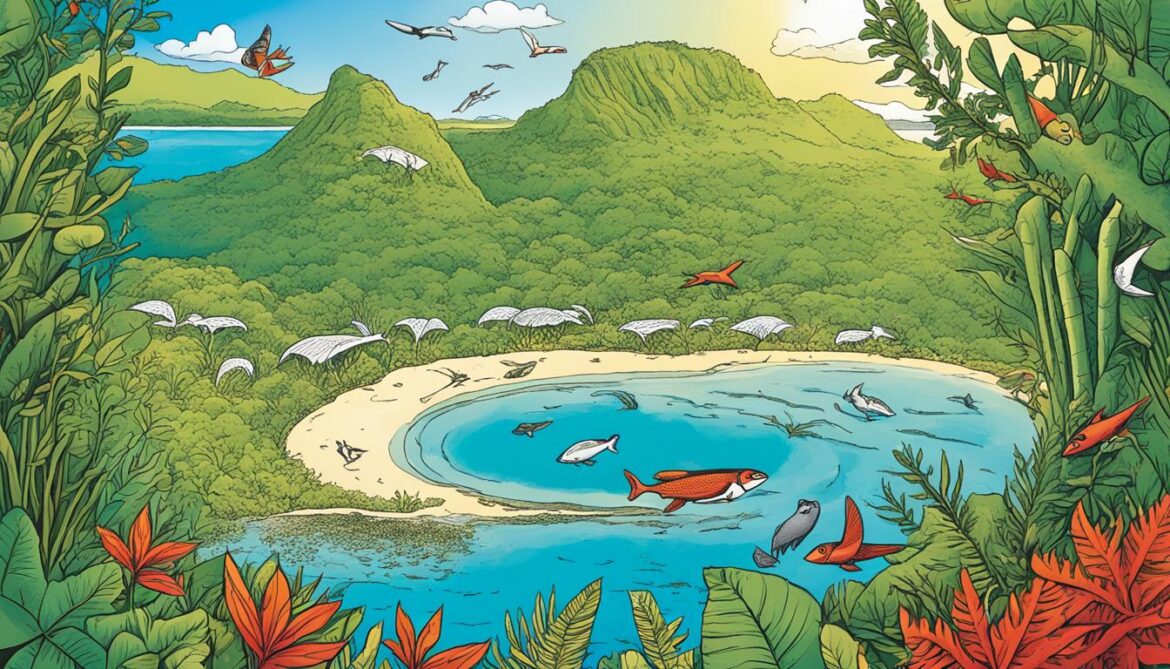
Integrating traditional ecological knowledge (TEK) and indigenous technical knowledge (ITK) into biodiversity conservation efforts is key to achieving sustainable development goals. By valuing and incorporating local knowledge, we can enhance the ecological sensitivity and effectiveness of conservation initiatives. The traditions, practices, and wisdom of indigenous communities, such as the Tonga, play a vital role in preserving biodiversity and nurturing a harmonious relationship with the natural world.
Geographic Spread of TEK in Biodiversity Conservation
While research on traditional ecological knowledge (TEK) and biodiversity conservation has focused primarily on certain regions of Africa, such as western, eastern, and southern Africa, there remains a significant gap in our understanding of TEK from other regions on the continent, including central and northern Africa. Existing studies have shed light on the interrelated forms of TEK utilized in promoting biodiversity conservation, but a more comprehensive exploration and documentation of TEK practices across the entirety of Africa is needed to gain a holistic understanding of its role in biodiversity conservation.
By studying TEK practices in different regions, we can uncover unique insights into sustainable practices, resource management, and ecological relationships, leading to more effective conservation strategies. To achieve this comprehensive understanding, further research efforts are necessary to explore and document the TEK practices of indigenous communities across Africa and their contributions to biodiversity conservation.
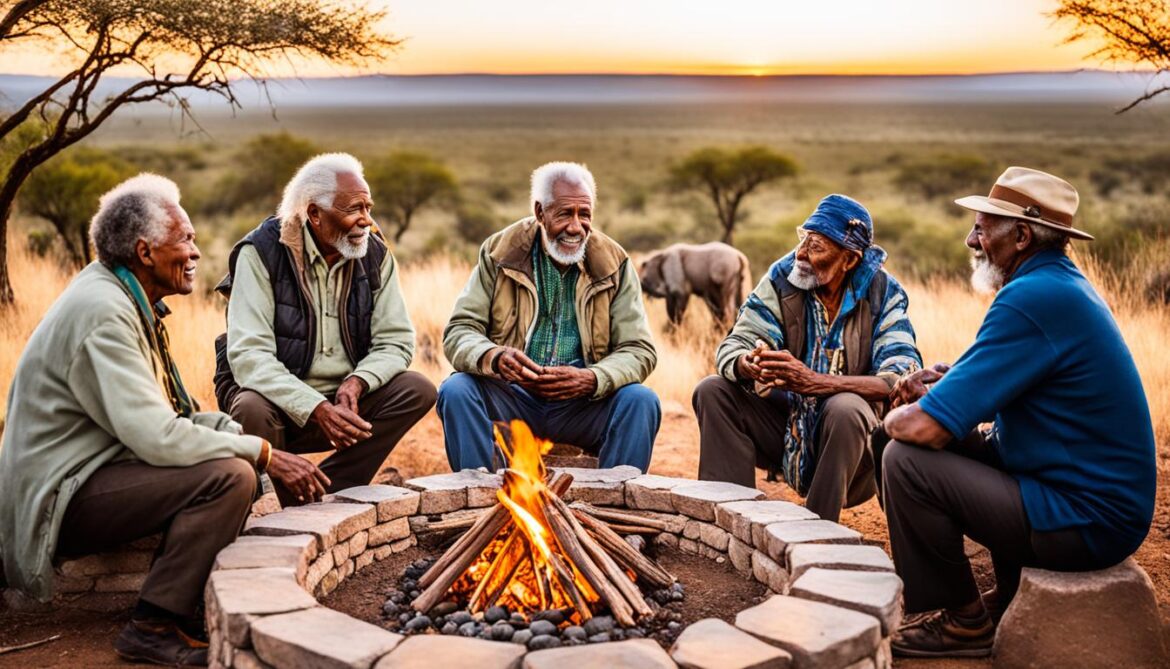
The Importance of Geographic Diversity
Exploring TEK practices across diverse regions of Africa is crucial for several reasons. Firstly, different regions may possess distinct ecological characteristics and challenges, requiring tailored approaches to conservation. By examining TEK in various contexts, we can gain insights into region-specific strategies and determine their applicability in other areas.
Secondly, understanding TEK practices across different regions allows for cross-cultural learning and knowledge exchange, fostering collaboration and mutual understanding. By sharing successful conservation practices, communities can learn from one another and adapt strategies to their specific contexts.
Facilitating Collaboration and Knowledge Sharing
By expanding the geographic spread of TEK research in biodiversity conservation, we can foster collaboration and engagement with diverse indigenous communities. This inclusivity allows for the co-creation of sustainable conservation strategies that incorporate local knowledge and cultural practices.
“Exploring TEK practices across diverse regions of Africa is crucial for gaining a comprehensive understanding of its role in biodiversity conservation.” – Environmental Science
Additionally, broadening our knowledge of TEK practices across Africa can uncover unique conservation practices and lessons that can be shared globally. This cross-pollination of indigenous knowledge systems and scientific research can contribute to a more holistic and ecologically sensitive approach to biodiversity conservation worldwide.
Role of TEK in Biodiversity Conservation Efforts
Traditional ecological knowledge (TEK) plays a significant role in biodiversity conservation efforts around the world. With its roots in local cultures and worldviews, TEK offers valuable insights into resource management, ecological relationships, and sustainable practices. By incorporating TEK into modern natural resource management, we can work towards achieving various sustainable development goals in a comprehensive and eco-friendly manner.
Indigenous communities like the Tonga have honed their traditional practices over generations, resulting in a wealth of long-standing wisdom and sustainable practices. Valuing and integrating TEK into conservation initiatives allows us to tap into this invaluable knowledge, enhancing our understanding and approach to biodiversity conservation.
One aspect where TEK shines is resource management. Indigenous communities have developed intricate systems to ensure the sustainable use and preservation of natural resources. These systems consider ecological limits, promote conservation practices, and foster a deeper understanding of the intricate relationships within ecosystems.
By valuing and integrating TEK, we can harness the collective wisdom of indigenous communities and combine it with contemporary environmental science to create robust and effective conservation strategies.
In addition to resource management, TEK also contributes to our understanding of ecological relationships. Indigenous communities possess intricate knowledge of the intricate web of life, how different species interact, and the delicate balance needed for ecosystems to thrive. This awareness helps identify the impacts of human activities on biodiversity and guides the development of conservation strategies that address these challenges.
The integration of TEK is crucial in achieving sustainable development goals. Through the utilization of traditional practices and knowledge, we can establish a holistic approach to biodiversity conservation that aligns with economic, social, and environmental objectives.
To illustrate the significance of TEK in conservation efforts, consider the following example: the Tonga people’s traditional knowledge and practices have played a central role in sustaining their local biophysical environment in Zambia. Their selective harvesting methods, reverence for water sources, and organic farming techniques are just a few examples of how TEK contributes to biodiversity conservation and environmental sustainability.
By recognizing the importance of TEK and integrating it into our conservation efforts, we can tap into centuries of accumulated wisdom and ensure the long-term preservation of biodiversity for future generations.
Challenges of TEK in Biodiversity Conservation
While traditional ecological knowledge (TEK) holds immense potential for biodiversity conservation, there are several challenges that hinder its recognition and integration into conservation efforts.
- Limited Documentation and Dissemination: One of the key challenges is the lack of comprehensive documentation and dissemination of TEK practices. Many valuable traditional knowledge systems remain underexplored and undocumented, preventing their wider application in conservation strategies.
- Inadequate Recognition and Support: TEK often faces inadequate recognition and support from policymakers and institutions. The value and efficacy of indigenous knowledge in biodiversity conservation need to be acknowledged and integrated into environmental policies and practices.
- Erosion of Traditional Knowledge: The rapid pace of modernization and globalization has led to the erosion of traditional knowledge systems. As younger generations embrace modern practices, there is a risk of losing the wisdom and techniques embedded in TEK.
In the context of Africa, another challenge is the lack of comprehensive information on TEK from different regions. This hinders the effective incorporation of indigenous knowledge into conservation strategies, as each region may have unique practices and insights to offer.
Addressing these challenges is crucial for maximizing the potential of TEK in biodiversity conservation. Comprehensive documentation, recognition, and support for indigenous knowledge systems can contribute to preserving cultural heritage and ensuring long-term environmental sustainability.
Challenges of Traditional Ecological Knowledge in Biodiversity Conservation
| Challenges |
Impact |
| Limited Documentation and Dissemination |
Hinders wider application of valuable traditional knowledge |
| Inadequate Recognition and Support |
Undermines the integration of TEK into policies and practices |
| Erosion of Traditional Knowledge |
Risk of losing valuable wisdom and techniques |
| Lack of Comprehensive Information |
Hampers effective incorporation into conservation strategies |
“Preserving and integrating traditional ecological knowledge is key to ensuring the sustainability of biodiversity conservation efforts.” – Environmental Science
Integrated Landscape Approaches and Indigenous Knowledge
Integrated landscape approaches have gained prominence in environmental governance, recognizing the interconnectedness of different ecosystems and the importance of engaging multiple stakeholders. This holistic approach acknowledges that landscapes are complex systems where various elements interact and influence one another. By considering the broader landscape context, decision-makers can develop more effective strategies for environmental management and conservation.
“Integrated landscape approaches allow us to bridge the gap between conservation and development. They recognize that diverse stakeholders, including indigenous communities, play a crucial role in achieving sustainable environmental governance.” – Dr. Jane Carter, Environmental Scientist
Indigenous knowledge and practices are integral to the success of integrated landscape approaches. Indigenous communities, like the Tonga people, possess a wealth of traditional knowledge that has been accumulated over generations. Their intimate understanding of local ecosystems and their sustainable practices can significantly contribute to landscape management strategies.
By incorporating indigenous knowledge into decision-making processes, policies, and practices, environmental governance can become more context-specific and culturally sensitive. This integration enhances the sustainable management of natural resources and biodiversity, taking into account the cultural values and practices of indigenous communities.
Zambia and Zimbabwe are exemplars of countries that have recognized the importance of indigenous knowledge in environmental governance. They have initiated programs that integrate traditional practices and indigenous knowledge into conservation and land management efforts. These initiatives aim to preserve biodiversity, enhance ecosystem resilience, and promote community-led sustainable development.
| Benefits of Integrated Landscape Approaches and Indigenous Knowledge |
Examples of Integration in Zambia and Zimbabwe |
- Enhanced biodiversity conservation
- Improved land and resource management
- Increased community engagement and empowerment
- Promotion of cultural heritage preservation
- Support for sustainable livelihoods
|
- Collaborative land-use planning involving local communities
- Recognition and integration of traditional ecological knowledge in conservation policies
- Development of community-based natural resource management initiatives
- Establishment of indigenous-led conservation areas
|
Integrating indigenous knowledge in environmental governance is a dynamic process that requires ongoing collaboration, dialogue, and capacity-building. It demands the recognition and respect of traditional practices, equitable decision-making processes, and the empowerment of indigenous communities.
By harnessing the wisdom and experiences of indigenous communities, integrated landscape approaches can achieve a more holistic and inclusive approach to environmental governance, leading to sustainable development and the long-term conservation of natural resources.
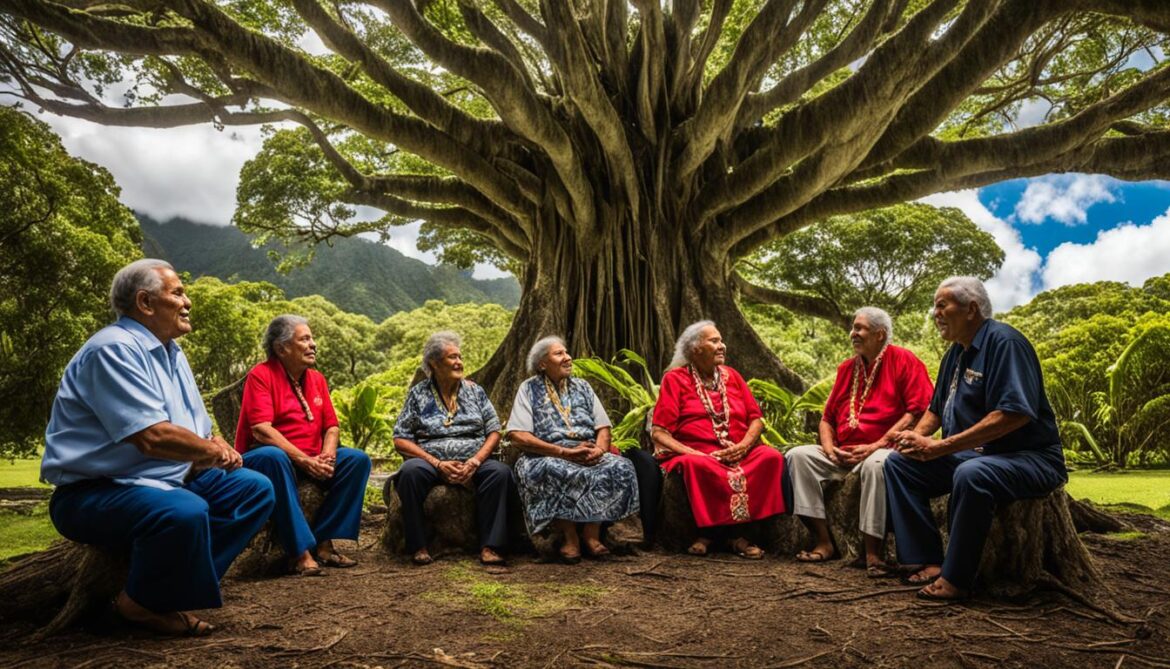
Conclusion
The Tonga people have demonstrated the effectiveness of their conservation efforts through their traditional knowledge and cultural practices. By employing selective harvesting, totemism and taboos, and organic farming, they contribute to the preservation of biodiversity and the overall health of their local biophysical environment. These practices, rooted in the Tonga’s traditional ecological knowledge, are not only valuable for their own community but also hold significance for biodiversity conservation worldwide.
Recognizing the importance of indigenous knowledge is crucial for achieving sustainable development. Integrating indigenous knowledge into environmental policies and practices allows for a more holistic approach to biodiversity conservation. However, there are challenges that must be addressed, such as the limited documentation and dissemination of traditional knowledge and the erosion of these practices due to modernization and globalization. Overcoming these challenges will contribute to the long-term conservation of biodiversity and the preservation of cultural heritage.
The Tonga’s conservation strategies, along with those of other indigenous communities, are valuable assets in the fight against environmental degradation. By valuing and integrating indigenous knowledge, governments, policymakers, and environmentalists can benefit from the wisdom and sustainable practices that have been passed down through generations. Through these collaborative efforts, we can work towards a future where biodiversity is conserved, and the delicate balance between nature and culture is maintained.
FAQ
What strategies have the Tonga people employed to sustain their local biophysical environment?
The Tonga people have employed various strategies such as selective harvesting, totemism and taboos, organic farming, crop rotation and intercropping, sanctity of water sources, and traditional authority to sustain their local biophysical environment.
How does the Tonga’s traditional knowledge contribute to conservation efforts?
The Tonga’s traditional knowledge, including practices like totemism, taboos, and reverence for water sources and sacred areas, plays a significant role in their conservation efforts. Their deep understanding of the local ecosystem and use of organic farming, crop rotation, and selective harvesting techniques contribute to the preservation of biodiversity and the overall health of their natural environment.
What is the role of cultural beliefs and practices in the conservation of the environment?
Cultural beliefs and practices, such as those found among the Tonga people, play a significant role in the conservation of the environment. These practices reflect the indigenous community’s commitment to living in harmony with nature and preserving their cultural heritage while ensuring environmental sustainability.
How can indigenous knowledge systems contribute to environmental conservation?
Indigenous knowledge systems, including the Tonga’s traditional practices, offer valuable insights into resource management, ecological wisdom, and cultural values that can contribute to effective biodiversity conservation efforts. Recognizing and integrating indigenous knowledge systems into environmental policies and practices is essential for achieving sustainable development and conserving biodiversity.
What challenges are associated with the recognition and integration of traditional ecological knowledge (TEK) in biodiversity conservation efforts?
Challenges include limited documentation and dissemination of TEK, inadequate recognition and support from policymakers and institutions, and the erosion of traditional knowledge due to modernization and globalization. Addressing these challenges is crucial for maximizing the potential of TEK in biodiversity conservation and ensuring the preservation of cultural heritage and environmental sustainability.
How can integrated landscape approaches benefit from indigenous knowledge?
By incorporating indigenous knowledge, including the traditional practices of indigenous communities like the Tonga, into decision-making processes, policies, and practices, integrated landscape approaches can be more context-specific and culturally sensitive. This enhances the sustainable management of natural resources and biodiversity.
What is the significance of traditional ecological knowledge (TEK) in biodiversity conservation?
Traditional ecological knowledge (TEK) provides unique insights into resource management, ecological relationships, and sustainable practices. By valuing and integrating TEK, such as the Tonga’s indigenous practices, conservation initiatives can benefit from the long-standing wisdom and sustainable practices of indigenous communities.
Where has research on traditional ecological knowledge (TEK) and biodiversity conservation been concentrated in Africa?
Research on TEK and biodiversity conservation has been concentrated in certain regions of Africa, such as western, eastern, and southern Africa. However, there is a need for more research and documentation of TEK practices across the continent to gain a comprehensive understanding of its role in biodiversity conservation.
How can traditional ecological knowledge (TEK) contribute to achieving sustainable development goals?
By incorporating TEK into modern natural resource management, various sustainable development goals can be achieved in a comprehensive and eco-friendly manner. The long-standing wisdom and sustainable practices of indigenous communities, such as the Tonga, can significantly contribute to biodiversity conservation efforts.
What is the role of indigenous knowledge in the United Nations Convention on Biological Diversity?
International organizations, such as the United Nations, have emphasized the importance of respecting, preserving, and maintaining the innovation and practices of indigenous and local communities related to the sustainable use of biological diversity. The recognition and promotion of indigenous knowledge in biodiversity conservation are essential for achieving sustainable development goals.
How does the Tonga people’s conservation efforts relate to the broader context of global environmental concerns?
The Tonga people’s conservation efforts, rooted in their traditional knowledge and cultural practices, have proven effective in sustaining their local biophysical environment. Their traditional ecological knowledge and practices, as well as those of other indigenous communities, hold significant value for biodiversity conservation efforts globally.
Source Links


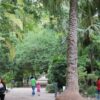






















Post comments (0)